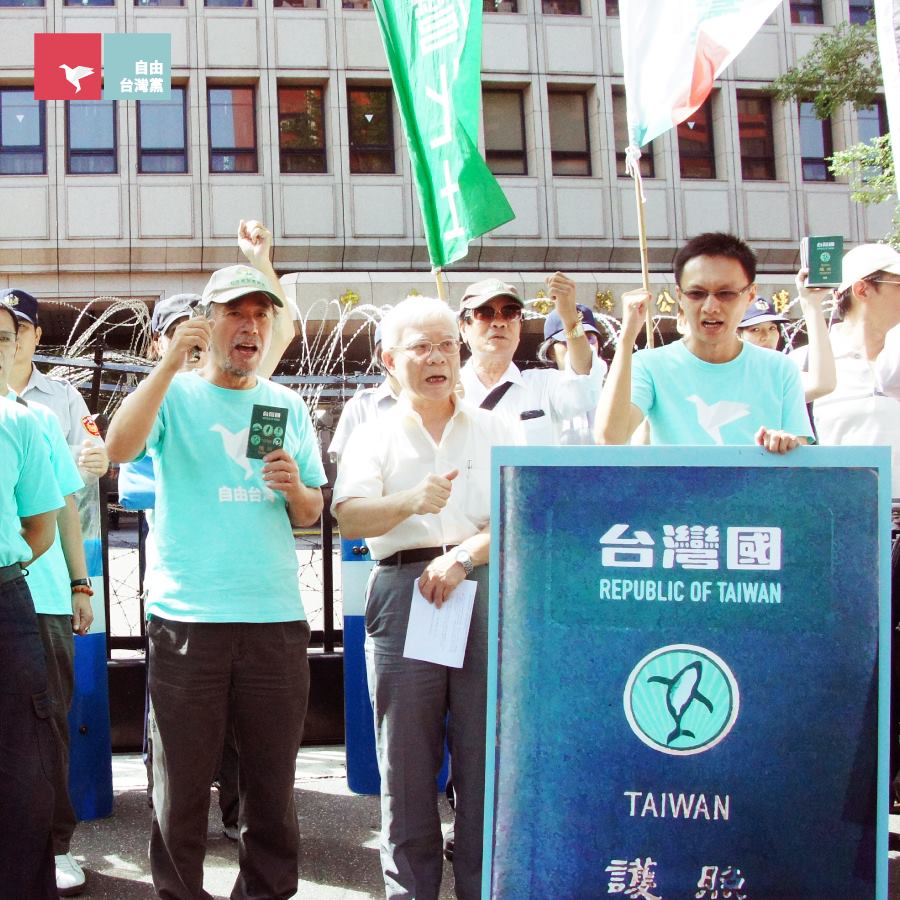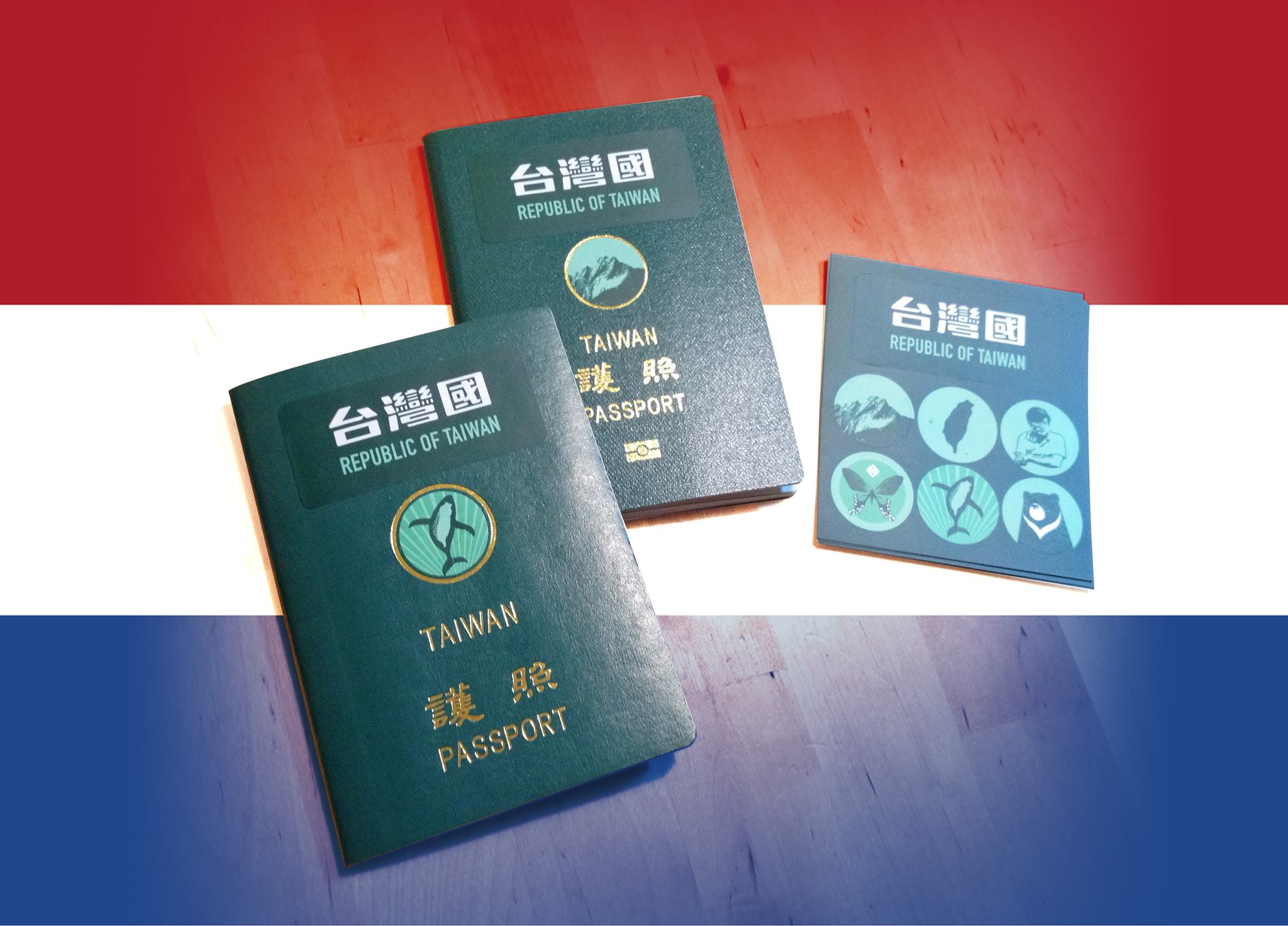The Taiwanese Passport and Taiwan’s Lack of International Recognition
by Brian Hioe
語言:
English
Photo Credit: Denis Chen
Recent Incidents Regarding the ROC Passport
WHAT’S IN A passport? This would be seem to be a question up in the air for Taiwan lately. A recent incident involving a Taiwanese citizen being refused admittance to the UN office in Geneva using a Republic of China passport as proof of identity has only driven home the point of Taiwan’s exclusion from the international community. China, in the meantime, has announced the implementation of an electronic card system replacing the “Taiwan compatriot travel document” used previously.
 Other prominent examples of protest art designed by Denis Chen include the ubiquitous “I am Taiwanese, I Stand for Taiwanese Independence” and “Fuck the Government” banners seen frequently at activist hang-outs. Photo credit: Denis Chen
Other prominent examples of protest art designed by Denis Chen include the ubiquitous “I am Taiwanese, I Stand for Taiwanese Independence” and “Fuck the Government” banners seen frequently at activist hang-outs. Photo credit: Denis Chen
Months previously, a campaign to put stickers on the “Republic of China” (ROC) passport to make it read “Republic of Taiwan” started by cafe owner and artist Denis Chen—designer of much of Taiwan’s iconic protest art of recent years—led to incidents in which Taiwanese citizens were questioned at customs. Apparently such incidents were less in cases of entering other countries, but when returning to Taiwan itself. But in recent days, with the unexpected popularity of the campaign, we see attempts by the Bureau of Consular Affairs to prevent the usage of “Republic of Taiwan” stickers altogether—director-general Kung Chung-Cheng warning that passports with such stickers could be confiscated by US Customs by individuals attempting to enter the US. Members of the pro-independence Free Taiwan Party and other civil society groups would demonstrate outside of the Bureau of Consular Affairs against these restrictions on Friday.
The ROC Passport as Embodying Taiwan’s Displacement from the International Community
THESE INCIDENTS are not unrelated. After all, what is it that constitutes a nation-state? In consideration of the characteristics of a nation-state, it is that no matter the difference in geographic size, size of the economy, or the size of the population, all nation-states are theoretically equal in the international community. So far as membership in the UN is usually held to be qualifier of membership in the international community, such it is that voting in the UN is each country having an equal say. It is not, after all, countries being allotted a certain amount of votes based on proportional representation of its population in relation to other nation-states—this despite that within many democratic member states of the UN, voting internally within each nation occurs on the basis of proportional representation on the basis of population.
Taiwan’s dilemma is twofold. Because of Chinese influence, Taiwan is excluded from the UN and more generally excluded from the international community. This is a peculiar status perhaps only shared in the world by Kosovo, which is excluded from the international community because of Russian influence. What Taiwan shares with Kosovo is that despite having an independent government, economy, and military, Taiwan lacks de jure recognition as a nation-state despite its de facto existence as a nation-state.
 Members of the Free Taiwan Party, including convener Tsay Ting-Kuei, seen here on the left, demonstrating outside the Bureau of Consular Affairs on Friday. Photo credit: Free Taiwan Party
Members of the Free Taiwan Party, including convener Tsay Ting-Kuei, seen here on the left, demonstrating outside the Bureau of Consular Affairs on Friday. Photo credit: Free Taiwan Party
Even if is such that the so-called “Taiwanese” passport sometimes is confused by customs officials as Chinese, given that it is the passport of the “Republic of China”, the fact that Taiwan has a passport of its own which is accepted in airports across the world is proof enough of Taiwan’s de facto existence as a nation-state. If it is that nation-states are thought of as theoretically equal, no matter disparities in geographic size or population, it is that nation-states also need conform to certain parameters as to the form of the nation-state as nation-states comprise the international community. For example, the flags of most nation-states all conform to the same rectangular shape, so far as flags are the representation of a nation-state to the international community. Or that the world’s currency mostly conform to certain standards in shape and form, even though we might keep in mind that many independent nation-states do not have independent currencies of their own, particularly within the European Union.
It is such that the world’s nation-states also have standardized passports, which are the currency by which citizens of a nation-state move across borders. As such, passports share certain standardized characteristics, as regulated by the UN body of the International Civil Aviation Organization (ICAO). The peculiarity of Taiwan’s de facto independence but lack of de jure independence is quite clearly reflected in the fact that Taiwan has a passport but is not a member state of the UN. Indeed, it is thus a paradox that the UN office in Geneva would deny admittance to a Taiwanese citizen on the basis of the ROC passport—never mind that the ROC passport is one which conforms to the standards set by and contains the ISO code designated for the ROC by the UN body of the ICAO to begin with! And it is ironic that Taiwanese are free to leave their country and enter any country on the basis of that passport but are denied entrance to the UN of all places, the supposed forum of the international community.
But if it is that China has put into place a special set of policies for Taiwanese wishing to travel to mainland China, it is because of the peculiar, maybe one of a kind relations between the People’s Republic of China (PRC) and Republic of China governments by which each claims the territory of the other as being part of its nation-state. Thus, travel to the PRC of ROC citizens from the standpoint of the ROC government cannot truly be “international” travel and travel to the ROC of PRC citizens from the standpoint of the PRC government also cannot truly be “international” travel. As a result, special travel documents are required for travel between Taiwan and China which are not exactly “visas” in the sense that one travels to foreign countries using visas.
 The old travel document required for ROC citizens to travel to the PRC (left) next to the new electronic card that will be implemented (right). Photo credit: WikiCommons
The old travel document required for ROC citizens to travel to the PRC (left) next to the new electronic card that will be implemented (right). Photo credit: WikiCommons
If China’s implementation of a special electronic card for travel between Taiwan and China is so threatening, part of the reason is because it upsets the balance by which the ROC and PRC have some semblance of parity in issuing the travel documents between the two countries. This is because China’s implementation of an electronic card system was unilateral in nature and not done in consultation with Taiwan. However, there is also that the new electronic card system implemented for Taiwan resembles that used with Hong Kong and Macau, as reflected in recent measures to make Chinese law apply to Taiwan as though Taiwan had no existence of its own. This is reflected in Beijing’s passage of a sweeping general security law which will clearly affect Hong Kong, but which has provisions affecting Taiwan which it has no real way of enforcing. If a recent incident in which Chinese police from Fujian province tried to order Kaohsiung police as if they had any real line of command over Taiwanese police raised hackles among Taiwanese police, this is another example.
The terrain of contestation here is almost entirely within the realm of appearances whereby nations attempt to assert their authority over the other, but little actually takes place in regards to that the de facto separation of Taiwan and China will continue. But on the Taiwan side, there is real fear that treating Taiwan as it is has no independent existence of own its will in fact eventually lead to it actually losing its independence.
Attempts to Take Back Representations of Identity
NEVERTHELESS WHY would it be that Taiwanese would see fit to seize the representation of the nation and identity back to themselves by modifying Republic of China passports from “Republic of China” to “Republic of Taiwan”? Namely, it is that Taiwanese who modify their passports to read “Republic of Taiwan” do not accept either the representation of Taiwan as “China” or the the KMT’s “Republic of China.” The act of modifying one’s passport, then, is a powerful symbol about national identity and how one might take one’s identity in one’s own hands.
There have been other art projects in which an unrecognized territory uses the passport as a medium to assert an independent existence. Palestinian artist Khaled Jarrar would in 2011 create a fake Palestinian visa to be stamped onto passports as a critique of Israel, for example. But this was in some sense a critique of the Israeli government from without, where the “Republic of Taiwan” passport is a critique of ROC and PRC alike. It may be this is an act of rebellion against both the KMT government within Taiwan and China’s claim over China from without.
 Photo credit: Denis Chen
Photo credit: Denis Chen
And this is a case of the Taiwanese people attempting to seize their own destiny in their own hands. However, as seen in the Bureau of Consular Affairs attempts to crack down on the usage of “Republic of Taiwan” stickers on ROC passports and subsequent demonstrations by Taiwanese civil society, it will ultimately take political action if it is that one day the ROC passport will in fact read “Republic of Taiwan” as more than wishful thinking.



 Members of the Free Taiwan Party, including convener Tsay Ting-Kuei, seen here on the left, demonstrating outside the Bureau of Consular Affairs on Friday. Photo credit: Free Taiwan Party
Members of the Free Taiwan Party, including convener Tsay Ting-Kuei, seen here on the left, demonstrating outside the Bureau of Consular Affairs on Friday. Photo credit: Free Taiwan Party
